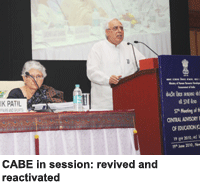 The 57th meeting of the Central Advisory Board of Education (CABE), held in Delhi on June 19 after a gap of about ten months, approved several initiatives and decisions of the Union HRD ministry in the intervening period, including implementation of a national core curriculum for science and mathematics by all higher secondary examination boards from the next academic year (2011-12). It also approved the draft of a National Academic Depository Bill, 2010 which empowers the HRD ministry to compile a national electronic database of academic records and awards.
The 57th meeting of the Central Advisory Board of Education (CABE), held in Delhi on June 19 after a gap of about ten months, approved several initiatives and decisions of the Union HRD ministry in the intervening period, including implementation of a national core curriculum for science and mathematics by all higher secondary examination boards from the next academic year (2011-12). It also approved the draft of a National Academic Depository Bill, 2010 which empowers the HRD ministry to compile a national electronic database of academic records and awards.
However, on the important issue of establishing an overarching National Commission for Higher Education and Research (NCHER) to subsume the University Grants Commission (UGC, estb. 1956) and the All India Council for Technical Education (AICTE, 1987), as recommended by the National Knowledge Commission and the Yash Pal Committee in June last year, the members of CABE haven’t reached a consensus. It is awaiting the report of a task force constituted in September last year to examine the draft NCHER Bill, amidst fears that the proposal may create a super regulator and promote excessive centralisation.
The high-powered task force drafting the Bill comprises Prof. M. Ananda-krishnan, chairman, IIT-Kanpur & former vice chancellor, Anna University, Chennai; Prof. M. K. Bhan, secretary, department of bio-technology, Union ministry of science and technology; Begum Syeda Saiyidain Hameed, chancellor, Maulana Azad National Urdu University; Dr. Narendra Jadhav, member, Planning Commission; Prof. Goverdhan Mehta, chairman of National Assessment and Accreditation Council, Bangalore; Prof. N. Madhava Menon, member, commission on Centre-state relations of the government of India, and Prof. Mrinal Miri, joint secretary (higher education).
The HRD ministry’s acceptance of the Yash Pal Committee’s recommend-ation to establish a seven-member autonomous National Commission for Higher Education and Research, on the lines of the Election Commission of India to insulate it against political pulls and pressures, has precipitated an intra-government turf war and aroused anxiety within state governments that they won’t have any voice in the operations of higher education institutions in their jurisdiction.
The Union health and law ministries are not ready to submit jurisdiction over medical and legal education to the proposed apex body and have made their opposition well known. Simultan-eously state governments fear that establishment of the NCHER will diminish their role and promote centralisation of higher education.
Dr. Vijender Sharma, former president of the Delhi University Teachers Association (DUTA), believes these fears are well founded. “The proposal to establish NCHER reflects the tendency of the Central government to centralise higher education supervision. It negates the role of state governments and academia in strengthening the higher education system in their respective areas and the country as a whole. It will prove to be retrograde for the development of higher education in India,” says Sharma.
Meanwhile CABE’s endorsement of the HRD ministry’s proposal of a common national maths and science syllabus cutting across all examination boards, has been widely welcomed. “A standardised maths and science curriculum is a good move as it will eliminate the pains of student mobility countrywide and will place students writing entrance exams such as IIT-JEE and AIEEE on an equal footing,” says G. Balasubramanian, former director of academics at CBSE and currently a Delhi/Chennai-based education consultant.
Yet perhaps the most beneficial outcome of these deliberations and debate is that CABE, which had been banished to cold storage for over a decade during the reigns of former Union HRD ministers Dr. Murli Manohar Joshi and Arjun Singh, has been revived and reactivated.
Autar Nehru (Delhi)